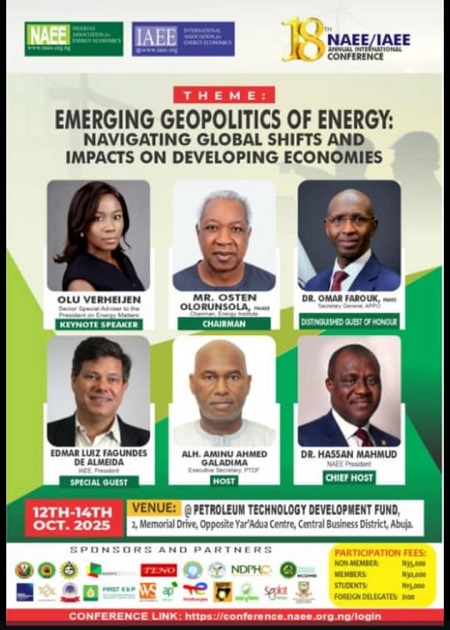Delivering remarks on behalf of the President of the International Association for Energy Economics (IAEE) at the 2025 Annual International Conference of the Nigerian Association for Energy Economics (NAEE) in Abuja, Professor Omowumi Iledare, PhD, FNAEE, SrFUSAEE, FEIN, reaffirmed IAEE’s enduring commitment to evidence-based global energy dialogue and inclusive knowledge exchange across regions and generations.
Speaking under the conference theme, “Emerging Geopolitics of the Energy Landscape — Navigating Global Shifts and Their Impacts on Developing Economies,” Professor Iledare described IAEE as “the world’s most vibrant and intellectually respected community bridging the energy-economy-environment nexus.” He emphasized that the Association’s purpose remains to advance understanding of energy economics through rigorous analysis, constructive dialogue, and professional collaboration.
“IAEE exists to analyze change through evidence, not emotion; through policy dialogue, not political posturing,” he said. “We must understand how global transformations intersect with regional priorities — especially for developing economies balancing energy access, climate responsibility, and growth.”
IAEE’s Global Reach and African Footprint
Founded in 1977, IAEE has grown into a global network with over 100 national affiliates and thousands of members in more than 100 countries. Professor Iledare highlighted that through this network, the Association continues to foster dialogue among academics, industry experts, regulators, and policymakers committed to shaping sustainable energy futures.
He singled out the Nigerian Association for Energy Economics (NAEE) as one of IAEE’s most active and visible affiliates worldwide, commending it for giving “voice and visibility to Africa’s developmental realities in global energy discourse.”
“NAEE’s consistent leadership has proven that intellectual excellence and policy relevance can coexist,” Iledare observed. “The Association has built bridges among academia, industry, and government — a true Triple-Helix-Plus collaboration model that reflects the spirit of IAEE globally.”
From Energy Access to Energy Prosperity
Reflecting on Africa’s broader energy context, Professor Iledare reiterated that Africa’s energy future must be defined by pragmatism, equity, and prosperity, not by imitation.
“Africa’s energy future is not a copy of Europe’s past,” he stated. “It must become a model of pragmatic prosperity — one that prioritizes affordable access, industrial competitiveness, and intergenerational equity.”
He urged deeper cooperation between African and global energy economists, encouraging more participation of young scholars in IAEE’s international programs, conferences, and publications. The IAEE President, he added, remains committed to enhancing African representation within IAEE’s leadership and advancing continental research and policy engagement.
A Renewed Commitment to Knowledge and Collaboration
Concluding his remarks, Professor Iledare reminded delegates that “ideas remain the most powerful form of energy — renewable, transferable, and transformative.”
He praised NAEE for sustaining the intellectual flame of the energy economics discipline and reaffirmed IAEE’s readiness to support further regional conferences, policy dialogues, and academic collaborations.
“When refined by dialogue and guided by data,” he said, “ideas illuminate paths to prosperity that no barrel of oil or cubic foot of gas alone can guarantee.”
The 2025 NAEE Conference, which brought together policymakers, corporate leaders, scholars, and students, continues IAEE’s long tradition of connecting global perspectives with local realities — turning knowledge into wisdom, and wisdom into action for a sustainable energy future.


Comment here